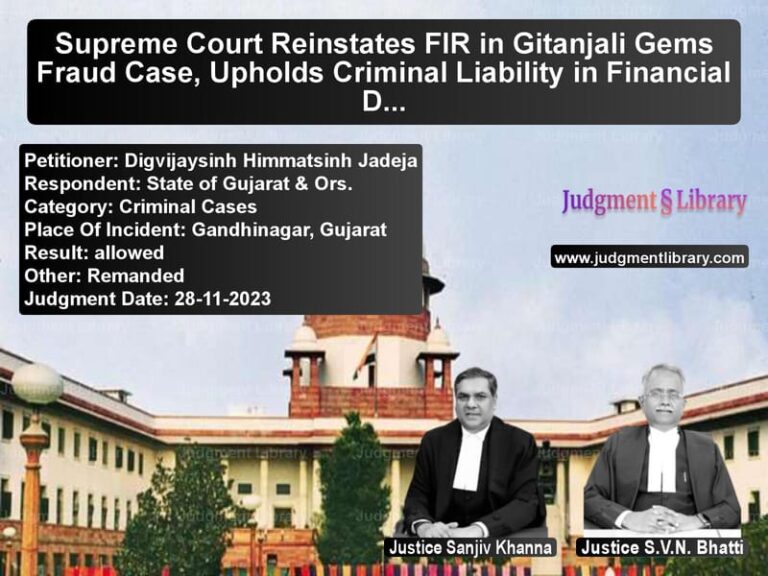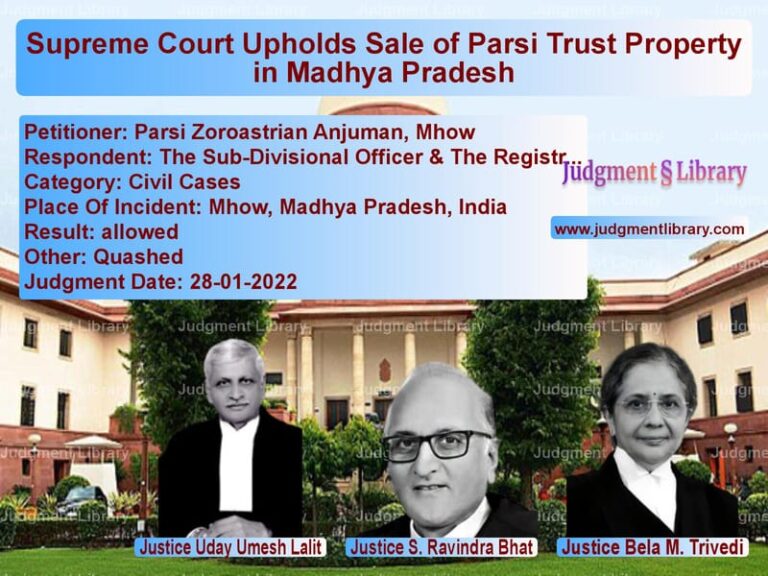Jurisdiction in 498A Cases: Supreme Court Allows Complaints at Parental Home
In a landmark ruling, the Supreme Court of India addressed the jurisdictional issue in cases filed under Section 498A of the Indian Penal Code (IPC), which deals with cruelty against a married woman. The case, Rupali Devi vs. State of Uttar Pradesh & Ors., involved the question of whether a woman who leaves her matrimonial home due to cruelty can initiate legal proceedings in the jurisdiction where she takes shelter with her parents.
The Supreme Court ruled in favor of the complainant, holding that cruelty under Section 498A IPC is a continuing offence. This means that if a woman faces mental trauma even after leaving her matrimonial home, she can file a case in the jurisdiction where she currently resides. This judgment significantly strengthens the legal recourse available to victims of domestic abuse.
Background of the Case
The case arose from multiple appeals where women had filed complaints under Section 498A IPC in their parental homes after facing cruelty in their matrimonial homes. The legal question before the Supreme Court was:
“Whether a woman forced to leave her matrimonial home on account of acts and conduct that constitute cruelty can initiate and access the legal process within the jurisdiction of the courts where she is forced to take shelter with the parents or other family members?”
The issue had been subject to conflicting judgments from various High Courts and previous Supreme Court rulings. The apex court took up the matter to settle the divergence of opinions.
Key Legal Provisions Examined
- Section 498A IPC: Deals with cruelty by a husband or his relatives toward a woman.
- Section 177 CrPC: States that an offence should be tried in the jurisdiction where it was committed.
- Section 178 CrPC: Provides exceptions where an offence is committed partly in one location and partly in another.
- Section 179 CrPC: States that if the consequence of an offence occurs in a different place, jurisdiction can be extended to that place.
Arguments by the Appellant (Rupali Devi)
The appellant, Rupali Devi, and other complainants argued:
- Even after leaving the matrimonial home, they continued to suffer mental trauma due to the acts of the husband and in-laws.
- Under Section 179 CrPC, if the consequences of an offence occur in another jurisdiction, that place should have the authority to try the case.
- Limiting jurisdiction to the matrimonial home would force victims to return to the place of abuse to seek justice.
- Several judgments, including State of M.P. vs. Suresh Kaushal and Sunita Kumari Kashyap vs. State of Bihar, supported this view.
Arguments by the Respondents (State of Uttar Pradesh & Others)
The respondents opposed the appeal, arguing:
- Jurisdiction should be determined by Section 177 CrPC, meaning the complaint must be filed where the offence was committed.
- Previous Supreme Court rulings, such as Y. Abraham Ajith vs. Inspector of Police and Ramesh vs. State of Tamil Nadu, had held that if no cruelty occurs in the parental home, jurisdiction does not extend there.
- Allowing complaints in parental homes could lead to forum shopping and harassment of the accused.
Supreme Court’s Observations and Ruling
The Supreme Court examined conflicting precedents and sided with the appellant. The Court ruled:
“The impact on the mental health of the wife by overt acts on the part of the husband or his relatives, the mental stress and trauma of being driven away from the matrimonial home and her helplessness to go back to the same home for fear of being ill-treated are aspects that cannot be ignored.”
The judgment provided a broad interpretation of Section 498A IPC, stating that cruelty can be both physical and mental:
“Mental cruelty borne out of physical cruelty or abusive and humiliating verbal exchanges would continue in the parental home even though there may not be any overt act of physical cruelty at such place.”
The Court further clarified that:
- The continuing offence doctrine applies to Section 498A IPC, meaning that suffering caused by cruelty persists beyond the matrimonial home.
- As a result, courts at the place where the wife takes shelter after leaving the matrimonial home due to cruelty would have jurisdiction.
- This interpretation aligns with the purpose of Section 498A IPC, which aims to protect women from domestic abuse.
Final Ruling
The Supreme Court allowed the appeals and ruled:
- A woman who has suffered cruelty in her matrimonial home can file a complaint in the jurisdiction where she takes shelter.
- The ruling overruled previous judgments that restricted jurisdiction to the place of the matrimonial home.
- The cases were remanded to the respective courts for fresh consideration based on this principle.
Implications of the Judgment
This ruling has far-reaching consequences for cases under Section 498A IPC:
- Expanded access to justice: Women facing cruelty no longer have to return to their matrimonial home to file complaints.
- Recognition of mental trauma: The judgment acknowledges that cruelty has long-term psychological consequences.
- Protection from further harassment: Victims can file cases in a safer environment, reducing intimidation from the accused.
- Legal clarity: The decision resolves conflicting precedents and sets a uniform rule for jurisdiction.
The Supreme Court’s ruling in Rupali Devi vs. State of Uttar Pradesh & Ors. is a progressive step in protecting the rights of women and ensuring their access to legal remedies.
Petitioner Name: Rupali Devi.Respondent Name: State of Uttar Pradesh & Ors..Judgment By: Justice Ranjan Gogoi, Justice L. Nageswara Rao, Justice Sanjay Kishan Kaul.Place Of Incident: Uttar Pradesh.Judgment Date: 09-04-2019.
Don’t miss out on the full details! Download the complete judgment in PDF format below and gain valuable insights instantly!
Download Judgment: Rupali Devi vs State of Uttar Prade Supreme Court of India Judgment Dated 09-04-2019.pdf
Direct Downlaod Judgment: Direct downlaod this Judgment
See all petitions in Domestic Violence
See all petitions in SC/ST Act Case
See all petitions in Judgment by Ranjan Gogoi
See all petitions in Judgment by L. Nageswara Rao
See all petitions in Judgment by Sanjay Kishan Kaul
See all petitions in allowed
See all petitions in Remanded
See all petitions in supreme court of India judgments April 2019
See all petitions in 2019 judgments
See all posts in Criminal Cases Category
See all allowed petitions in Criminal Cases Category
See all Dismissed petitions in Criminal Cases Category
See all partially allowed petitions in Criminal Cases Category







